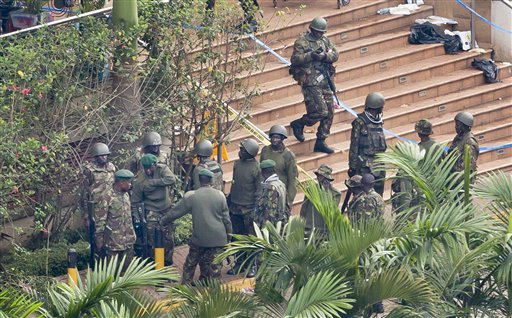(AP) Militant group attacks Kenyan border town
By TOM ODULA
Associated Press
NAIROBI, Kenya
The Islamic extremist group that killed scores of people at a Nairobi mall attacked two Kenyan towns near the Somali border, killing three people. The leader of the Somali group affiliated with al-Qaida said the attacks will continue until Kenyan troops are withdrawn from Somalia.
The leader of al-Shabab said in a message that there is no way Kenya can “withstand a war of attrition inside your own country.”
Al-Shabab attacked Nairobi’s upscale Westgate mall Saturday and held it for four days in a siege in which at least 67 people were killed. Forensic experts from around the world, including the U.S., Britain and Germany, continued their work Thursday reconstructing events in the crime scene including by carrying out fingerprint, DNA and ballistic analysis.
Early Thursday, Al-Shabab fighters attacked the border town of Mandera, killing two police officers, injuring three others and destroying 11 vehicles, said regional police chief Charlton Mureithi.
Wednesday night, al-Shabab attacked the border town of Wajir, 390 kilometers (240 miles) southwest of Mandera. One person was killed and four wounded after a gunman opened fire and threw grenades.
Kenya has suffered many such attacks by al-Shabab along its 682 kilometer (423 mile) border with Somalia but they take on new significance following the Westgate Mall attack.
The Kenyan government said the international response is being coordinated by the international police agency Interpol, which sent an incident response team that arrived in Nairobi on Wednesday.
Interpol official Jean-Michel Louboutin said his team includes disaster victim identification and data specialists who will carry out real-time comparisons of evidence collected inside the mall against the France-based agency’s database on DNA and fingerprints from its 190 member country network.
He added that Interpol is also ready to mobilize additional support if needed, including from its counter-terrorism and criminal analysis units
Al-Shabab said the Nairobi mall attack was not only directed at Kenya, but was also “a retribution against the Western states that supported the Kenyan invasion and are spilling the blood of innocent Muslims in order to pave the way for their mineral companies,” according to the statement from Godane.
There has been a global response to the mall attack, with forensic experts from several Western countries working Thursday to investigate the mall site, said Kenyan police spokeswoman Gatiria Mboroki. She said she had no details on what the experts had found so far in the bullet-scarred, scorched mall and that their work was expected to take a week.
Washington is providing technical support and equipment to Kenyan security forces and medical responders, said U.S. Ambassador Robert Godec. The U.S. is assisting the investigation to bring the attack’s organizers and perpetrators to justice, he said Wednesday.
At least 18 foreigners were among those killed when the militants entered the Westgate Mall on Saturday, firing assault rifles and throwing grenades, including six Britons and citizens from France, Canada, the Netherlands, Australia, Peru, India, Ghana, South Africa and China.
In addition to those killed at the mall, another 175 people were injured, including more than 60 who remain hospitalized.
Morgue officials in Nairobi have been preparing for a large influx of bodies still in the mall. Officials have told The Associated Press that the shopping center could hold dozens more bodies.
Authorities have said at least five al-Shabab attackers were killed and another 11 suspects have been taken into custody.
In his statement, Godane said only that “some” of his fighters had been killed, possibly suggesting that others escaped.
During the four-day fight, the mall roof collapsed, causing massive destruction. The collapse came Monday, shortly after four large explosions rang out followed by billows of black smoke. A government minister said the terrorists had set mattresses on fire, causing the roof to collapse, but it seemed unlikely the fire would have caused the massive destruction.
Al-Shabab, whose name means “The Youth” in Arabic, first began threatening Kenya with a major terror attack in late 2011, after Kenya sent troops into Somalia following a spate of kidnappings of Westerners inside Kenya.
The mall attack was the deadliest terrorist attack in Kenya since the 1998 al-Qaida truck bombing of the U.S. Embassy in Nairobi, which killed more than 200 people.
_____
Associated Press writer David Rising in Nairobi, Kenya contributed to this story

COMMENTS
Please let us know if you're having issues with commenting.